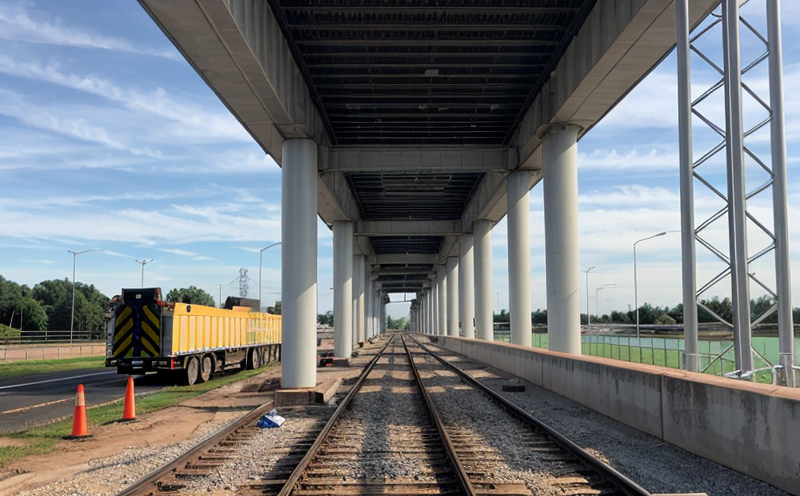ISO 9001 Quality Management in Infrastructure Projects
The implementation of ISO 9001:2015 Quality Management Systems (QMS) in infrastructure projects is a critical aspect for ensuring robust quality assurance and continuous improvement. This international standard provides the framework to ensure that organizations deliver consistent, high-quality products and services. In the context of building and infrastructure testing, adherence to ISO 9001 ensures that all processes—from procurement to final inspections—are optimized for efficiency and effectiveness.
ISO 9001 is particularly beneficial in the construction sector where multiple stakeholders are involved, and numerous quality parameters need to be monitored. From site management teams ensuring compliance with design specifications to third-party suppliers verifying raw materials, ISO 9001 helps streamline these processes through a structured approach that emphasizes risk assessment, continuous improvement, and customer satisfaction.
The standard is applicable across various stages of infrastructure projects, including:
- Project planning and budgeting
- Procurement and supply chain management
- Construction and installation processes
- Quality assurance and quality control measures
- Final inspections and testing procedures
- Maintenance and post-construction support
The key components of ISO 9001 include:
- Policies and Procedures: Establishing clear policies and procedures for the management of quality.
- Risk Management: Identifying potential risks and implementing preventive measures to mitigate them.
- Continuous Improvement: Regularly reviewing processes to identify areas for improvement.
- Data Collection & Analysis: Collecting data from all stages of the project to analyze performance and compliance with standards.
In summary, ISO 9001 is not just a set of procedures but a commitment to excellence. It ensures that every stakeholder in an infrastructure project understands their role and responsibilities, thereby minimizing errors and enhancing overall quality.
Why Choose This Test
- Compliance with International Standards: Adherence to ISO 9001 ensures compliance with international best practices for quality management.
- Risk Mitigation: By identifying and addressing potential risks, this standard helps prevent costly errors and delays.
- Customer Satisfaction: Focus on customer satisfaction fosters long-term relationships and enhances reputation.
- Process Optimization: Continuous improvement leads to more efficient processes and cost savings.
- Transparency: Clear documentation of all quality-related activities ensures transparency for all stakeholders.
- Employee Engagement: A structured approach promotes a culture of continuous learning and development within the organization.
The implementation of ISO 9001 in infrastructure projects is particularly advantageous because it addresses the diverse needs of various stakeholders, including clients, suppliers, regulators, and end-users. This comprehensive approach ensures that all aspects of the project are managed with precision and care.
Moreover, ISO 9001 offers a structured method for quality management that can be adapted to different scales of projects and varying degrees of complexity. It is recognized globally, providing an international benchmark for excellence in infrastructure development.
Environmental and Sustainability Contributions
The implementation of ISO 9001 Quality Management Systems not only ensures high-quality outcomes but also contributes significantly to environmental sustainability. By focusing on continuous improvement and process optimization, organizations that adopt this standard can minimize waste and resource consumption. This aligns perfectly with the growing emphasis on sustainable development in infrastructure projects.
ISO 9001 encourages the integration of environmental considerations into all stages of project management. For instance, through effective procurement practices, organizations can source materials from suppliers committed to sustainability. Additionally, ISO 9001 promotes the use of renewable resources and energy-efficient technologies, contributing to a greener infrastructure.
Achieving compliance with ISO 9001 also helps in meeting regulatory requirements for environmental protection. By implementing robust quality management practices, organizations can ensure that their projects comply with local, national, and international environmental regulations. This not only avoids penalties but also enhances the organization's reputation as a responsible corporate citizen.
Furthermore, ISO 9001 facilitates better stakeholder engagement in sustainability initiatives. Through continuous communication and collaboration, stakeholders are kept informed about sustainable practices and their benefits. This fosters trust and support for the project among all parties involved.
Use Cases and Application Examples
| Project Stage | Application of ISO 9001 |
|---|---|
| Initial Planning | - Conduct risk assessments for potential project risks. - Develop quality policies and procedures tailored to the project requirements. |
| Procurement | - Ensure suppliers meet ISO 9001 standards. - Implement robust supplier evaluation processes. |
| Construction Phase | - Monitor construction activities against quality policies and procedures. - Conduct regular internal audits to ensure compliance with ISO 9001. |
| Final Inspections | - Perform final inspections according to ISO 9001 criteria. - Document all findings for future reference. |
| Maintenance and Support | - Provide ongoing maintenance services that comply with ISO 9001 standards. - Offer support systems that ensure continuous improvement in quality management. |
ISO 9001 is widely used across various infrastructure projects, from road construction to renewable energy installations. Here are some real-world examples:
- Road Construction: Ensuring that all materials meet the required quality standards as per ISO guidelines.
- Bridges and Dams: Implementing strict quality control measures during construction to prevent structural failures.
- Renewable Energy Projects: Guaranteeing that all components are installed according to best practices, ensuring long-term efficiency and reliability.
In each case, ISO 9001 provides a structured framework for managing quality throughout the project lifecycle. This ensures not only the highest standards of construction but also contributes positively to environmental sustainability.





